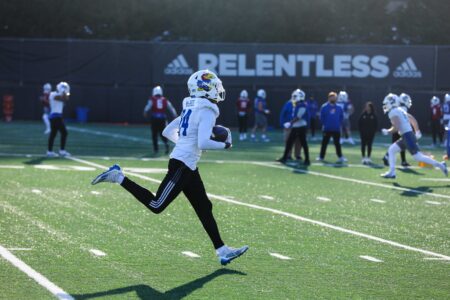Quigley newly inspired
I’m told the Corpus Christi Catholic School substitute teacher, who offered his services in exchange for a promise he would not receive compensation, walked into the third-grade classroom wearing a suit and quickly set down his rules.
Rule No. 1: No pushing and shoving.
Rule No. 2: No yelling and screaming.
Rule No. 3: No smoking.
At that point, a boy in the classroom raised his helping hand to inform the teacher that one of his rules wasn’t necessary.
“Mr. Mangino,” the boy is said to have said, “I don’t think we’re allowed to smoke.”
Mr. Mangino — as in Mark Mangino, Kansas University’s first winning football coach since John Hadl’s coach, the late Jack Mitchell — adjusted his rule book.
“Well, then you only have to worry about two rules,” Mr. Mangino informed the classroom.
Rare is the teacher who reaches every one of his pupils, but here’s guessing those third-graders couldn’t wait to get home to tell mom and dad about their substitute teacher.
When football was the subject Mangino taught, he reached enough players to post a 12-1 record and win an Orange Bowl one season, but that doesn’t mean he reached them all.
Mangino and running back-turned-linebacker-turned-running back Angus Quigley used to be on the same football field every day, but they never were on the same planet.
Mangino wanted Quigley to run with his pads much lower to the ground, and Quigley ran upright. Quigley ran well, averaging 5.4 yards per carry and rushing for five touchdowns on 76 attempts in two seasons. He fumbled now and then, perhaps as a result of running too upright, and was switched to linebacker.
He’s fired up about returning to running back in this, his sixth season in the program and fourth year of eligibility. He’s also ecstatic about the coaching change.
“If there was a doghouse, I most definitely was in it,” Quigley said. “I asked about a doghouse one time, and he said there was no doghouse, so we won’t even talk about that, but there had to be a doghouse.”
Why does he think he was in it?
“I honestly can’t tell you,” Quigley said. “I’ve never been a guy to miss class. I’ve graduated. I’m pursuing my second degree here. I never missed tutoring. I came out here and worked hard. … I don’t know. It was weird. I’ll just leave it at that.”
This is where I entered the conversation, asking, “Was it a pad-level thing? Could it have been as simple as that?”
Quigley dismissed that theory.
“No,” he said. “I’m running the exact same right now, and I’m getting reps.”
Quigley said that being 6-foot-2 makes pad level “a constant struggle” and said running-backs coach Reggie Mitchell suggested he do a lot more stretching.
“He’s pushing me and telling me how I go about doing that instead of, ‘Oh well, I told you, and you can’t get it done.’ It’s been fun getting the encouragement and the teaching,” Quigley said.
He added that at the end of last season he was sure he would not apply for an extra year of eligibility. Then, he said, athletic director Lew Perkins and assistant AD Chris Howard sat down with him and informed him there would be a coaching change. Quigley decided to give playing for Turner Gill a shot.
“Coach Gill was introduced as the head coach,” Quigley said. “I listened to him talk, and I couldn’t help but be impressed. … The man has a mission statement.”
Which is?
“The mission statement is to enjoy the college football experience, and that’s what he’s trying to do,” Quigley said. “You’ve got a guy who comes in and says, ‘There’s no cussing anywhere in the facility. You’re not going to be demeaning.’ You can’t help but respect a man like that. … You always want to play out of respect for a man, not fear.”
Quigley said he likes how Gill has competitions in the middle of practice designed to make sure practice is enjoyable.
“They don’t want us to be out here like robots,” Quigley said.
Mangino and Gill certainly have different styles, but don’t ever expect the current coaching staff to criticize the previous one. They’ve seen enough film to know their predecessors were darn good at their jobs, organizing players in such a way as to put them in positions to make plays against much faster competition. They know how tough it will be to improve upon Mangino’s accomplishments.
The key lies in upgrading recruiting. The hope is that when word spreads about how much Kansas players are enjoying their college football experience, more elite athletes will want to join them. Watching how it all plays out over the next few years will be nothing short of fascinating.







